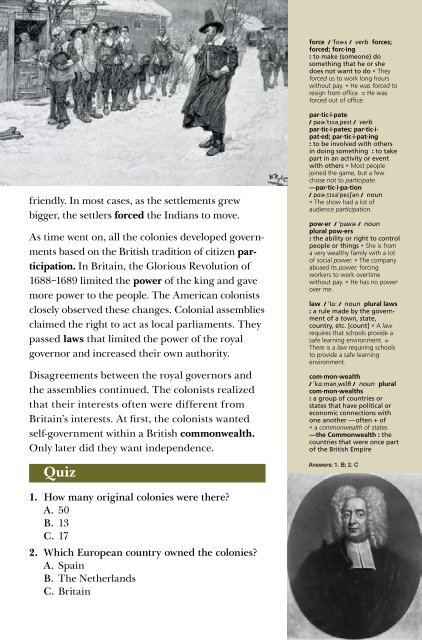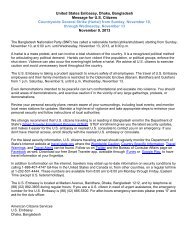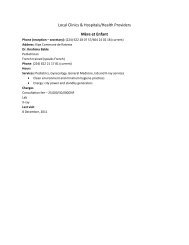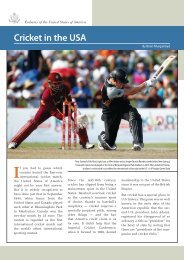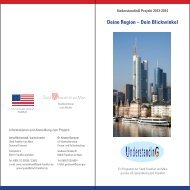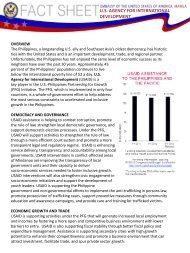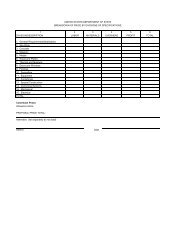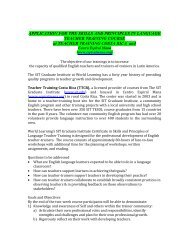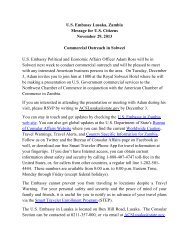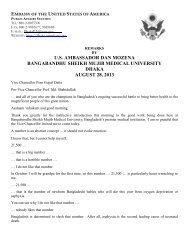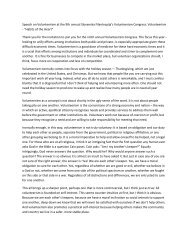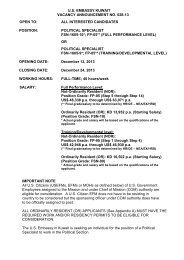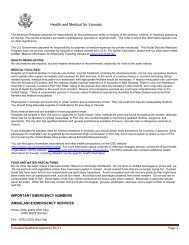Quiz - US Department of State
Quiz - US Department of State
Quiz - US Department of State
You also want an ePaper? Increase the reach of your titles
YUMPU automatically turns print PDFs into web optimized ePapers that Google loves.
friendly. In most cases, as the settlements grew<br />
bigger, the settlers forced the Indians to move.<br />
As time went on, all the colonies developed governments<br />
based on the British tradition <strong>of</strong> citizen participation.<br />
In Britain, the Glorious Revolution <strong>of</strong><br />
1688–1689 limited the power <strong>of</strong> the king and gave<br />
more power to the people. The American colonists<br />
closely observed these changes. Colonial assemblies<br />
claimed the right to act as local parliaments. They<br />
passed laws that limited the power <strong>of</strong> the royal<br />
governor and increased their own authority.<br />
Disagreements between the royal governors and<br />
the assemblies continued. The colonists realized<br />
that their interests <strong>of</strong>ten were different from<br />
Britain’s interests. At first, the colonists wanted<br />
self-government within a British commonwealth.<br />
Only later did they want independence.<br />
<strong>Quiz</strong><br />
1. How many original colonies were there?<br />
A. 50<br />
B. 13<br />
C. 17<br />
2. Which European country owned the colonies?<br />
A. Spain<br />
B. The Netherlands<br />
C. Britain<br />
force / ˈfoɚs / verb forces;<br />
forced; forc·ing<br />
: to make (someone) do<br />
something that he or she<br />
does not want to do • They<br />
forced us to work long hours<br />
without pay. • He was forced to<br />
resign from <strong>of</strong>fice. = He was<br />
forced out <strong>of</strong> <strong>of</strong>fice.<br />
par·tic·i·pate<br />
/ pɑɚˈtɪsəˌpeɪt / verb<br />
par·tic·i·pates; par·tic·i·<br />
pat·ed; par·tic·i·pat·ing<br />
: to be involved with others<br />
in doing something : to take<br />
part in an activity or event<br />
with others • Most people<br />
joined the game, but a few<br />
chose not to participate.<br />
—par·tic·i·pa·tion<br />
/ pɑɚˌtɪsəˈpeɪʃən / noun<br />
• The show had a lot <strong>of</strong><br />
audience participation.<br />
pow·er / ˈpawɚ / noun<br />
plural pow·ers<br />
: the ability or right to control<br />
people or things • She is from<br />
a very wealthy family with a lot<br />
<strong>of</strong> social power. • The company<br />
abused its power, forcing<br />
workers to work overtime<br />
without pay. • He has no power<br />
over me.<br />
law / ˈlɑ: / noun plural laws<br />
: a rule made by the government<br />
<strong>of</strong> a town, state,<br />
country, etc. [count] • A law<br />
requires that schools provide a<br />
safe learning environment. =<br />
There is a law requiring schools<br />
to provide a safe learning<br />
environment.<br />
com·mon·wealth<br />
/ ˈkɑ:mənˌwɛlθ / noun plural<br />
com·mon·wealths<br />
: a group <strong>of</strong> countries or<br />
states that have political or<br />
economic connections with<br />
one another —<strong>of</strong>ten + <strong>of</strong><br />
• a commonwealth <strong>of</strong> states<br />
—the Commonwealth : the<br />
countries that were once part<br />
<strong>of</strong> the British Empire<br />
Answers: 1. B; 2. C<br />
11


